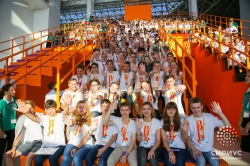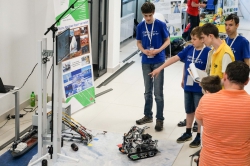Vladimir Vasilyev, ITMO's Rector — on the high-priority educational projects
In the beginning of September, the Presidential Council offered me to lead the workgroup on educational projects. By October, 10th we are to present the first results — the deadlines are really strict. As of now, we are working in several directions. First of all, it's the new school where the changes will take place — we are going to transform the school educational standards. We are going to work on training new teachers that will correspond to modern requirements. The other profile will have to do with new subjects that we now call "technologies". It will be about further education that implies creation of technoparks and reconstruction of technical and natural science's clubs at schools. We'd also use the help of local administrations and universities. The third direction we work on has to do with secondary vocational education in the World Skills sphere. Surely, we won't forget about electronic and distance education, as well as higher vocational education. All these initiatives are supported by both the government and employers. I mention it because all the opinions from this conference will be reflected in the documents we currently develop. The world is changing, education changes — we shouldn't lag behind but be one step forward.

Elena Chernishova, chair of the "System" charity foundation — on adapting talents
Do we really need "Lefty's"? (Ed. — Lefty, or Left-Handed Craftsman — a character from a well-known story by N. Leskov) Many times I hear from our employers that our most talented children who win competitions and contests are really hard to work with. It doesn't mean that no one needs them — on the contrary; it's just that it takes a lot of time and effort. I see such work as a possible way of investment. If we want to develop STI, we have to develop, to "train" our employers as well — which includes making them ready for such investments. As our universities work on getting better positions in international rankings, our employers have to work on getting more talents as well. There should be more companies that will employ uncommon, but really gifted workers — it's necessary for the future of our economy. That's why our "Elevator to the Future" program works with such children — we know them and understand that we have to work with them.

Yulia Selukova, Head of the "Elevator to the Future" project — on teaching "real life" experience
At most Russian technical universities there are local accelerators that stimulate students to develop the startup culture. In many, innovation studies is the basis of Bachelor's and Master's programs. Still, only few succeed in this. Unfortunately, in modern academic community entrepreneurship is considered something unfit for a scientist. As for the level of school education, it's totally lacking any lessons on this sphere. How can a child choose innovation studies as his specialty if he doesn't even know such thing exist? Also, sometimes students themselves aren't ready to choose such a path, which reflects the devaluation of scientific, technical and engineering education. The problem of such professions as engineer or scientist losing their popularity is quite pressing.
At our engineering schools, we train our students "in field conditions". They work on technical projects in conditions close to real ones. As in real projects, they have to deal with the costs of the project and assess its competitiveness. Thus, children start to understand marketing — and it is an essential part of any innovation.
Surely, it's hard to "make" someone an entrepreneur — as it's more of a talent one is born with. Still, experience shows that entrepreneurs and engineers have a lot in common. They all aspire to do everything by themselves and create the necessary infrastructure for their ideas, become leaders of the team.
Maxim Ivashenko, Head of ITMO's Open Laboratory for Ideas, Methodology and Practices (OLYMP) — on conditions for talented children
One has to be honest with schoolers — tell them what's really happening in the world, what awaits them after they graduate. They have to understand their possibilities. During the forum in Yekaterinburg last year, representatives from several organizations shared that everything goes well for them except for the lack of personnel. So, the question is: how can anything be well if schoolers don't understand why go to such employers and what to do there? So, our young talents get confused.
There are lots of ambitious children. We gather them at our laboratories. There might be not many of them in a single school or university, but there lots of them in a city. And each wants to show himself. If you speak the same language and tell them that there are of course problems in the world, but they can solve them, change everyone's future — then these children will be willing to take responsibility. You have to learn to trust them and supervise their work, so that they'll help you redevelop your school, university, enterprise — whatever it is. Anyone may have the potential — it's just you need the necessary conditions to bring it out.

Oleg Golin, head of the Nissa Digispace company — on affordable education for development of leading technologies
We have to give schoolers an opportunity to work with modern equipment, so they will know of the diversity of means they can use to bring their ideas to life. The younger ones who have more energy and are open to new ideas may even get ahead of the older children if they have access to complex technologies at this age.







